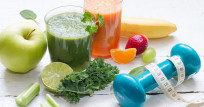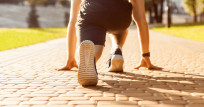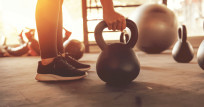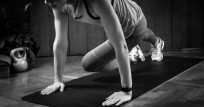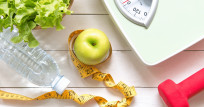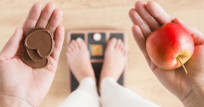How to get rid of water retention?
Water retention what can we do about it?
I'm sure you’ve heard it before -‘water retention’, but what is it exactly? Why does it happen to us and how to get rid of it?
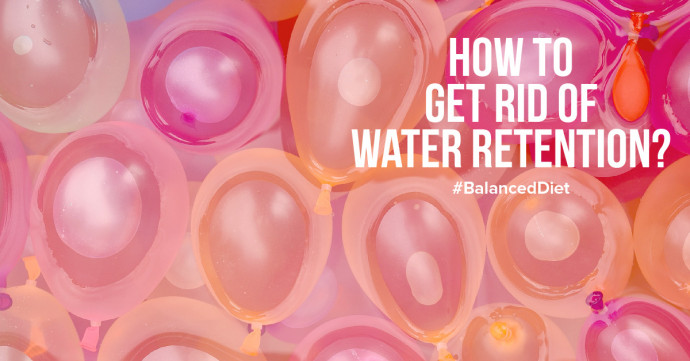
Simply said, water retention is excess fluids building up inside your body. And why does it happen? There are several reasons:
- Physical inactivity, e.g. long flight, being bedridden
- Hormonal changes during pregnancy or before ‘that time of the month’ (sorry, ladies)
- Stress
- Indulging in too much sodium (a.k.a. salt)
- New exercise regime
Can we influence our water weight?!
There are two water weight-related circumstances we can influence:
- Water weight that comes from indulging in too much sodium or from hormonal changes caused by monthly periods or new exercise regime
Too much salt or hormone-related water retention will go away once you lower the salt intake, adapt to the exercise, or finish your period.
- Water weight correlated with the bodily fuel source glycogen that’s important to staying healthy.
Glycogen-related water weight won’t go away unless you do it intentionally. The best example are bodybuilders looking to attain that “shredded” look right before a competition.
They are known to consume foods that are low fat and high carb, like potatoes and sweet potatoes, as opposed to oatmeal and pasta, because they retain more water.
And they keep their water intake to a minimum (right before the show-no water at all to achieve that vascular and toned look).
Even boxers, wrestlers, and MMA fighters are known to dehydrate themselves to “make weight” for their competition. Would I do it? Hmm, nope!
Water retention is usually not bad
Water retention is not bad, but it can feel uncomfortable because of the unwanted bloating and puffiness in the body. However, usually, it won’t cause any health problems.
When do you need to see a doctor in case of water retention?
If you're experiencing sudden or severe water retention - that can mean a serious medical problem like kidney disease or heart failure. In that case - hospital asap!
Why is water so important for humans?
Water is the driving force of all nature. Leonardo da Vinci
Let's walk down the memory lane, biology class 1-on-1:
Every tissue and cell in your body is somewhere between 55 (adult females) and 60 percent (adult male) water, with your muscles packing in even more fluid (I’ll explain later in this blog). That’s the reason we should drink enough water as our bodies do not function very well without water.
Water Intake and Exercise
“Hydrate, people!” It is something I yell a lot between the reps in my classes. There is no exact amount of water we should drink because it depends on a lot of variables. But, most recommendations say to drink two dl of water every 15-30 minutes. I prefer to take small sipes more often.
See it this way - if you sweat a lot and you don’t replenish the water, it contributes to sluggish workouts. According to Sports Nutrition, “losing as little as 2% of your body weight in water causes impaired exercise performance, while losses greater than 5% can decrease exercise capacity by about 30%”.
If you want to go to extreme lengths to check the adequate water intake during your workout (especially cardio-based endurance workouts) - weigh yourself (naked!!!) before and after the workout.
You might need a calculator for this: If your post-workout weight is more than 2% lower than your pre-workout weight, you need to up your water intake during your next workout. I'm not going into more detail because as soon as there are numbers involved, my head will explode!
Keep calm & drink more water!
Long-term dehydration can cause overall fatigue, headaches, and OVER-EATING! Yes, you heard me! When you are dehydrated, your body will hold on to everything you eat and drink (thank you kidneys and hormones!) Your body is continuously working on either to conserve the fluid or to eliminate it.
Fluid balance in your body = adequate blood pressure
Why do I have water retention?
I mentioned it before - your body weight fluctuates every day. During your day, you can gain 2kg of water, depending on what you are doing and eating.
Soooo, if you gain water weight by the end of the day, how long does it take to get rid of it? Same as with “baby weight” - days, weeks, months. It will accumulate in the soft tissue underneath the skin and cause visible swelling.
Lets take a look at the biggest cause of water retention - salt!
We often don’t realize how much salt (sodium) we consume. Packaged and restaurant foods are the most significant contributors to excess salt intake. That’s why I’m a big believer in food prep.
Sodium is a crucial electrolyte our cells need to signal, but if you consume too much, your body will retain water to keep blood level concentrations balanced. Once you lessen the salt intake, you’ll pee more often ;-)
I don’t know about you, ladies, but when I’m ‘pre-menstrual’, I crave salt, carbs, and chocolate. The only thing that keeps me from devouring anything that contains any of these three ingredients is - drinking lots and lots of water!
Carbs and Water Retention
Ok, let's talk carbs. Your consumption of carbs has an immense impact on whether and how you store water. But that doesn’t mean it will cause water retention. That’s because of your body stores carbs in the liver and skeletal muscles as glycogen - and you need glycogen to fuel your muscles during exercise. Glycogen loves water, but that water is 55 to 60% in your tissues and cells.
Difference between water loss and weight loss
Ok, I said this many many times. Losing water weight, the first 2-4kg, is not the same as losing body fat! To burn body fat (and lose weight), and keep it off, requires proper eating habits combined with exercise (cardio and weights).
And patience! It took you some time to get where you are now - and it will take some time to get you where you want to be. If you have a hot date and you want to look as toned as you can - you can try the rapid water weight loss. But don’t make it a habit! It’s not healthy!
Fountain of Wisdom: Water retention is pretty normal, and it fluctuates. Opt for a balanced diet that includes whole, healthy foods, exercise at least three times a week and drink lots of water - you’ll be alright!
-
Daria MagdaQi gong practiceUS$ 1,84 pm
-
Volha Khatkevichlife and food coachUS$ 0,29 pm
-
Marcela CmarkovaLifestyleCoachingUS$ 1,56 pm
-
Mursal AhmadiPsychologist / CoachUS$ 1,42 pm
-
Kiko HirakawaHealth CoachUS$ 0,53 pm
-
Rey KetenLife Coach & MentorUS$ 0,92 pm












